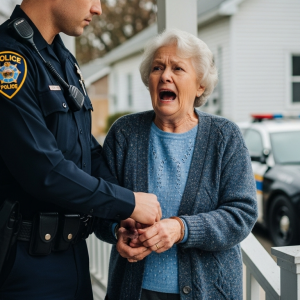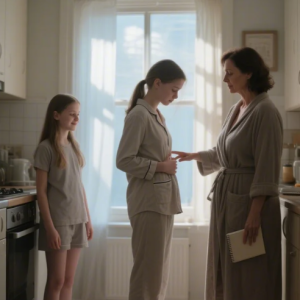My mother had me when she was 20. My biological father was never in the picture; he’d made it clear he never wanted children and took the out my mother offered him when she became pregnant. Supported by my grandparents, she finished her education, got a good job, and eventually, when I was eight, she started dating a co-worker named Harry.
They dated for three years before getting married. Harry and I were never close, but we coexisted peacefully enough. Four years after their wedding, my mom became pregnant with twins. Everyone was overjoyed, including me. I was a teenager, preoccupied with the naive idea that a mother’s love was unconditional. I thought, she struggled so much to raise me alone, she’d never leave me now.
I was wrong. After she married Harry, she began to distance herself from me, a slow, almost imperceptible drift that I dismissed as a phase. During her pregnancy, I tried my best to be supportive, but my presence only seemed to irritate her. To keep the peace, I tried to make myself scarce, to become invisible in my own home. It wasn’t enough.
Six months after the twins were born, she and Harry sat me down for a “serious conversation.” I had just turned 16. They told me, their voices laced with feigned regret, that with two new babies to care for, they simply couldn’t keep me in the house any longer. They couldn’t legally evict me, of course. Instead, they tried to persuade me, highlighting the financial burden of a large family on their “meager” income—the income of two web engineers that had, until that point, supported us comfortably.
It was clear they just wanted me gone. Even then, I tried to bargain. “If it’s about money,” I offered, my voice trembling slightly, “I can get a part-time job.”
My mother shook her head. Her next words would shatter the last of my illusions. “We need to save money and resources for the children who deserve it more.” She didn’t say they needed it more. She said they deserved it more.
That was it. That was the moment I knew I had to leave. It was obvious I was no longer wanted. Their strategy worked perfectly. By nudging me just right, they forced me out without ever having to officially evict me. I packed a bag and walked straight to my grandparents’ house, leaving the only home I had ever known.
My grandparents were furious with my mother, but they didn’t cut her off, not wanting to lose contact with the twins. I saw my mother and Harry occasionally when they visited, but our interactions were formal, sterile. They rarely asked about my life. They seemed happier, lighter, without me there. The visible decrease in my mother’s irritability in my absence was a quiet, constant pain.
At 16, I got a part-time job to avoid being a financial burden on my aging grandparents. When it was time for college, my mother and Harry refused to help, claiming they had to save for the twins’ future. I had to take out a student loan, and thankfully, one of my uncles agreed to co-sign for it. My grandparents were too old and frail to help me move into my dorm, so I had to rely on friends.
Once I started college, my mother and I barely spoke. When I graduated, only my grandparents were there. My mother didn’t even bother to call.
After college, I worked tirelessly. The first few years were lean, living on a tight budget to cover rent, utilities, and my student loan payments. But slowly, things got better. I rose through the ranks at my company. I’m proud of how far I’ve come with almost no help. Now, at nearly 33, I hold a Senior Management position.
About four months ago, I got a major promotion. I kept it quiet, only telling a few people, including the uncle who had co-signed my loan. I wanted to thank him properly. I’m sure he meant well, but at a recent family gathering, he told my mother about my success and urged her to get in touch to congratulate me.
She never called to congratulate me. Instead, she found out where I lived.
They showed up at my door, my mother and Harry, insisting they needed to talk. I hadn’t spoken to her in years; I had blocked her everywhere after graduation, realizing there was no point in hoping she would ever change. The only reason I let them in was a foolish, flickering hope that they had come to make amends.
They didn’t. They began by expressing their “surprise” that I had kept my success from them, as if I owed them updates. They were “disappointed” that I had shut them out of my life.
“You were old enough to understand,” Harry said, his tone condescending. “We had to rearrange our priorities. You should have supported our decision, not held a grudge by running to your grandparents.”
They were trying to gaslight me into believing I was the villain for being angry that they had kicked me out. Before I could even respond, they launched into their tale of woe. Their own business venture had failed, leaving them with heavy losses. And now, with the twins nearing college age, they desperately needed money.
I saw it then, the real reason they were here.
“We were thinking,” my mother said, attempting a warm smile, “that you could make it up to us by paying for your siblings’ schooling. It would be a great way for you to be part of the family again.”
The audacity of it stunned me. They were trying to frame it as if they were doing me a favor by allowing me to pay for the education of two children I barely knew.
My voice was ice. “Absolutely not. It is incredibly disrespectful for you to even think you could coerce me into this.” I reminded them that they were the reason I had to work through college, the reason I had debt. They refused to support me then because they wanted to save for their “real” children.
“You have no right to expect anything from me now,” I continued, my voice rising with years of suppressed anger. “You wanted to save money and resources for the children who deserved it. You can use that same money now to pay for their college.”
I told them to leave. Their faces soured. They tried to blame me, saying I had been “overenthusiastic” and “irritable” as a teenager. That I was ungrateful for all the years my mother raised me alone. The dispute became personal and ugly. Finally, I threatened to call the police if they didn’t leave my property. As they left, my mother’s final words were, “You were always ungrateful. The one time I needed you, you make me out to be the villain.”
After that day, my mother began a campaign of harassment. She sent emails every other day, reminding me of all she “did for me,” trying to guilt me into feeling like I owed her. I replied once, laying out all the facts. As expected, she called me ungrateful again. I told her that name-calling wouldn’t change the truth and that I wanted no further contact with her. I blocked her email. She made a new one. I blocked that one, too.
A few days ago, she did the most bizarre thing yet. She showed up at my workplace.
Fortunately, I was feeling under the weather and had taken the day off. The receptionist called, telling me my mother was there, demanding to see me and refusing to leave. They put her on the phone.
“I’m at home,” I told her firmly, though my heart was pounding. “And if you attempt anything at my place of work, I will sue you until you are too ashamed to send your children to college.” I did my best to sound threatening. It must have worked, because she agreed to leave immediately, provided I met her in person.
“You are not in a position to be making demands,” I said coldly. “You can’t afford a lawsuit right now. Leave quietly.”
I guess she finally left. But that was a near miss. It was the last straw.
Then, a few days ago, the final act played out. When I got home from work, she was waiting outside my door. I immediately told her I wouldn’t argue and that if she didn’t leave, I would call the police. As I reached for my phone, she raced at me, throwing me to the ground. My phone went flying. She cursed at me, blaming me for everything wrong in her life as she tried to hit me.
I was so stunned by her insane behavior it took me a moment to react. But I work out consistently, and it was easy to overwhelm her. The shouting had alerted my neighbors, who called the police and came to my aid, restraining my mother until they arrived.
I pressed charges. She is in a lot of trouble now. I’ve spoken with my lawyer and am getting a restraining order. Harry, I’ve been told, has taken the twins and moved in with his parents.
I’m finally free. I’ve already started looking into moving to a larger home. It’s embarrassing to be linked to someone like that, and I hope she gets the help she needs. But her problems are her own to solve. I’m no longer worried about it. I have my own future to build.
When I pressed charges, I thought the rest would be procedural — statements, paperwork, court dates. What I didn’t expect was the immediate fallout that followed.
Two days after her arrest, I got a call from my grandparents. They were shaken. My mother had called them from jail, crying, claiming I had “overreacted” and “ruined her life.” She told them I’d physically assaulted her. The fact that there were multiple neighbors as witnesses didn’t seem to matter in her retelling. In her mind, she was the victim — as always.
My grandparents didn’t believe her version entirely, but they were old, tired, and hated conflict.
“Maybe you could just drop the charges?” my grandfather asked gently over the phone.
“Grandpa,” I said, my voice steady but sharp, “if I drop these charges, she’ll be back at my door next month. This isn’t about anger anymore. It’s about safety.”
There was silence. Then he sighed. “I understand. I just hate to see the family like this.”
I swallowed hard. Family like this? It had been broken long before police reports and restraining orders.
That night, Harry called. I didn’t recognize the number, so I picked up.
“She’s not well,” he started, his voice low and strangely subdued. “She’s… not the same person I married.”
“She’s the same person she’s always been,” I corrected him. “You just ignored it until now.”
He exhaled heavily. “I’m trying to keep the twins out of this mess. They don’t know the full story. They just know their mother is… gone for a while.”
“They’re almost adults,” I said. “They deserve the truth.”
“Maybe,” he admitted, “but I don’t know how to tell them that their mom assaulted their sister.”
“She’s not my sister,” I snapped before I could stop myself. “She gave up that role the day she told me I didn’t deserve to stay in my own home.”
There was a long pause. Then, quietly, “You’re right.”
A week later, my lawyer confirmed the court had granted me a temporary restraining order. The hearing for a permanent one was in two months. It meant she couldn’t contact me, couldn’t come near my home or workplace. For the first time in months, I slept without checking the locks twice.
But peace didn’t mean silence.
I started getting anonymous texts from numbers I didn’t know. At first, they were vague — “You’ll regret this” — then increasingly bitter. I knew it was her. I forwarded every one to my lawyer.
The messages stopped after I sent one final reply:
“Every word you send me goes straight to the police. Try me.”
In the meantime, my life… kept going. Work was demanding but fulfilling. I finalized the down payment on the bigger home I’d been eyeing — a quiet place with a fenced yard and no shared walls with neighbors. My friends teased me about how much I talked about “my fortress,” but I knew what it represented: a life with boundaries no one could bulldoze.
One Saturday, while packing, I found an old shoebox buried in my closet. Inside were photos from before everything went bad — my mother holding me as a toddler, my grandparents smiling, a younger me grinning awkwardly at a middle school science fair. For a moment, I let myself remember that little girl who thought her mom’s love was permanent.
Then I put the lid back on the box. That girl didn’t exist anymore. And that was okay.
The permanent restraining order hearing was surreal.
She showed up looking tired, older, and surprisingly small in the courtroom. But the venom in her eyes was exactly the same. She didn’t speak to me directly — everything was filtered through her lawyer — but the accusations were predictable: I was ungrateful, I’d “abandoned” her, I was exaggerating the assault.
My lawyer calmly presented the neighbor statements, the police report, the 911 recording. The judge listened, expressionless, then granted the restraining order for five years.
As we left, she called out from behind the security officers:
“You’ll regret this when you’re alone in that big empty house!”
I didn’t even turn around.
A month later, I moved into my new home. The first night there, surrounded by unopened boxes and the smell of fresh paint, I stood in the middle of my living room and felt something I hadn’t felt in years.
Safe.
No lingering dread. No wondering if she’d be waiting in my driveway. No emotional landmines waiting in my inbox.
That night, I invited a few close friends over for pizza on the floor. We laughed, told stories, christened the space with warmth that had nothing to do with blood ties. One of them raised a slice in a toast:
“To family you choose.”
I raised mine back. “To peace.”
The twins never reached out. I don’t know if Harry told them what happened, or if they’ve been fed another one of her twisted narratives. Part of me hopes they find their own truth one day. But it’s not my job to fix that.
I did write one short email to Harry, though:
“If the kids ever need help — real help, not money for you — give them my number. Until then, I want no contact.”
He replied with a single sentence: “Understood.”
Every so often, I catch myself thinking about the “what ifs.
What if she hadn’t remarried?
What if she hadn’t had the twins?
What if she had just… chosen to love me the way I needed?
But then I remember — people show you who they are, and they rarely change. She made her choice. And I finally made mine.
Three weeks ago, I hosted my first holiday in my new home. Just me, my grandparents, a few cousins, and friends. The air was filled with laughter, the smell of roast chicken, the clinking of glasses. At one point, my grandmother took my hand and said, “I’m proud of you. Not just for your job, but for knowing when to protect yourself.”
It meant more than she could know.
Now, when I look back, I don’t see a story about losing a mother. I see a story about finding myself. About surviving betrayal without letting it harden me into something bitter. About learning that family is a privilege, not an obligation.
And I know this much: if she ever tries to cross my boundaries again, I’ll be ready. Not with anger. Not with fear. But with the quiet certainty that I owe her nothing — not my time, not my money, not my peace.
Because my life… finally belongs to me.




